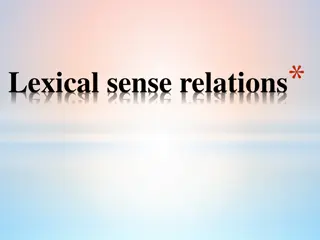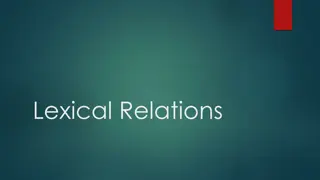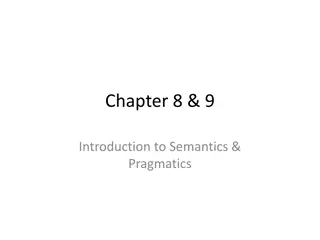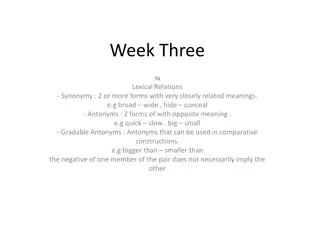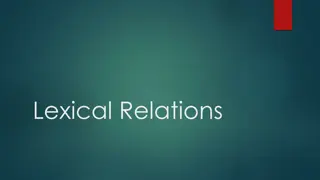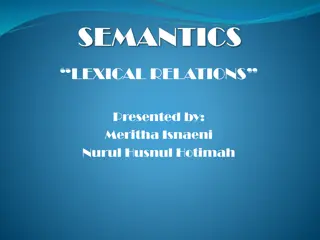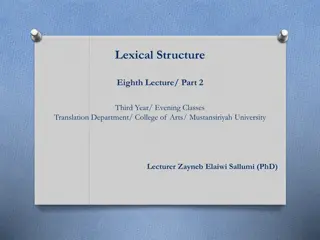Lexical Sense Relations and Word Meanings
Investigating sense relations between words involves exploring synonyms, antonyms, hyponymy, and meronymy to understand the meanings of words in different contexts. By examining semantic similarities and syntactic relationships, one can better comprehend how words relate to one another, leading to a
2 views • 28 slides
Lexical Relations: Synonyms, Antonyms, Hyponymy, and Prototype
Explore the concepts of synonyms, antonyms, hyponymy, and prototype in lexical relations. Learn how closely related words can be substituted for each other, understand opposites, inclusion in meanings, and characteristic instances in word categories.
0 views • 12 slides
Semantic Relations in Language
In semantics and pragmatics, sense relations are categorized into paradigmatic, syntagmatic, and derivational axes. Paradigmatic relations involve semantic choices within a sentence structure, while syntagmatic relations connect items within the same sentence. Examples include synonymy, hyponymy, me
1 views • 33 slides
Lexical Relations in Linguistics
Different types of lexical relations such as synonymy, antonyms, hyponymy, homophony, and homonymy play a crucial role in understanding the nuances of language. Synonyms have closely related meanings, antonyms have opposite meanings, while hyponymy and hypernymy show hierarchical relationships betwe
0 views • 4 slides
Lexical Relations in Language
Explore the concepts of synonymy, antonymy, hyponymy, and prototype in linguistics. Learn about words with closely related meanings (synonyms), opposite meanings (antonyms), inclusive meanings (hyponyms), and characteristic examples (prototypes) within lexical relations.
0 views • 12 slides
Lexical Relations in Language
Lexical relations play a crucial role in understanding the meanings of words in any language. They encompass relationships like entailment, paraphrase, and contradiction, shedding light on how lexemes are interconnected. Additionally, lexical fields and kinship systems offer further insights into ho
0 views • 10 slides
Lexical Structure: Antonymy, Hyponymy, and Components
Antonymy refers to words with opposite meanings, divided into gradable and non-gradable categories. Hyponymy involves one term's meaning being included in another. Relational opposites show reversal of relationships, while componential analysis breaks down word meaning into distinct elements.
0 views • 7 slides
